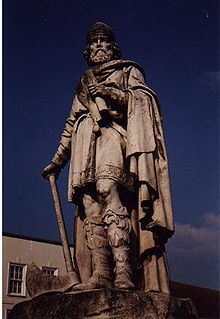 Statue in Wantage, England, of Alfred the Great, king of England from 871 to 899. | |
| Gender | Masculine |
|---|---|
| Name day | January 3 (Sweden, Norway) |
| Origin | |
| Language(s) | English |
| Word/name | Germanic |
| Meaning | From the Anglo-Saxon name Ælfræd, formed from the Germanic words ælf, meaning "elf", and ræd, meaning "counsel" |
| Other names | |
| Nickname(s) | Al, Alf, Alfy, Alfie, Fred, Freddy |
| Cognate(s) | Ælfræd (Anglo-Saxon) Alfreð (Icelandic) Alfréd (Hungarian, Slovakian) Alfred (Catalan) Alfredo (Italian, Portuguese, Spanish) Alfrēds (Latvian) Alfredas (Lithuanian) Alfredi (Albanian) Fredo (diminutive of Alfredo) |
Alfred is a masculine given name of English origin, a modern descendant of the Anglo-Saxon name Ælfræd (Old English pronunciation: [ˈæɫvræːd]), formed from the Germanic words ælf, meaning "elf", and ræd, meaning "counsel".[1][2] Its feminine form originating from Romance languages is Alfreda, and diminutives of Alfred include Al, Alf, Alfy, Alfie, Fred, and Freddy. After the 11th-century Norman Conquest, many variants of the name emerged, most of which were not carried to the modern day.[1] Today, Alfred is still in regular usage in a number of different regions, especially Great Britain, Africa, Scandinavia, and North America. It is one of the few Old English names that came into common use in Europe.[1] Its name day is the 3rd of January both in Norway and Sweden.[3]
- ^ a b c Hanks, Patrick; Hardcastle, Kate; Hodges, Flavia (1991). "Alfred". Oxford Dictionary of First Names (2nd ed.). Oxford University Press. p. 9. ISBN 978-0-19-861060-1. Retrieved 3 September 2022 – via Internet Archive.
- ^ Campbell, Mike. "Meaning, origin and history of the name Alfred". Behind the Name. Retrieved 2018-12-03.
- ^ Nancy L. Coleman; Olav Veka (2010). A Handbook of Scandinavian Names. Madison, WI: University of Wisconsin Press. p. 150. ISBN 9780299248338.